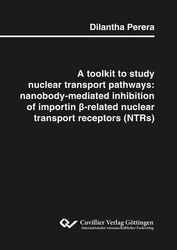| Fachbereiche | |
|---|---|
| Buchreihen (97) |
1382
|
| Nachhaltigkeit |
3
|
| Gesundheitswesen |
1
|
| Geisteswissenschaften |
2372
|
| Naturwissenschaften |
5408
|
| Mathematik | 228 |
| Informatik | 320 |
| Physik | 980 |
| Chemie | 1364 |
| Geowissenschaften | 131 |
| Humanmedizin | 243 |
| Zahn-, Mund- und Kieferheilkunde | 10 |
| Veterinärmedizin | 108 |
| Pharmazie | 147 |
| Biologie | 835 |
| Biochemie, Molekularbiologie, Gentechnologie | 121 |
| Biophysik | 25 |
| Ernährungs- und Haushaltswissenschaften | 45 |
| Land- und Agrarwissenschaften | 1005 |
| Forstwissenschaften | 201 |
| Gartenbauwissenschaft | 20 |
| Umweltforschung, Ökologie und Landespflege | 148 |
| Ingenieurwissenschaften |
1798
|
| Allgemein |
98
|
|
Leitlinien Unfallchirurgie
5. Auflage bestellen |
|
Erweiterte Suche
A toolkit to study nuclear transport pathways: nanobody-mediated inhibition of importin β-related nuclear transport receptors (NTRs)
Dilantha Perera (Autor)Vorschau
Leseprobe, PDF (3,9 MB)
Inhaltsverzeichnis, PDF (73 KB)
Eukaryotic cells are divided into a nuclear and a cytoplasmic compartment. This separates transcription from translation and makes gene expression dependent on nucleocytoplasmic transport. The members of the importin β superfamily function as shuttling nuclear transport receptors (NTRs) that recognize and actively transport cargoes through nuclear pores. An estimated 5 000 to 10 000 different human proteins are subject to active nuclear transport. Numerous cargo/NTR pairs have been identified, however, we are still far from a complete understanding as it has been very challenging to setup a systematic in vivo analysis that integrates the impact of all transport pathways.
In this study, we obtained anti-NTR nanobodies against TRN1, Xpo4, Xpo7, and CAS. Our aim was to identify nanobodies, and prepare nanobody fusions, that impede nuclear pore-passage of the targeted NTR and thus, interrupt a given transport cycle. These nanobody fusions were observed to inhibit the partition of NTR/cargo complexes into a reconstituted FG phase. We also observed that the nanobodies and nanobody fusions inhibit NTR transport in permeabilized cells.
| ISBN-13 (Printausgabe) | 9783736978478 |
| ISBN-13 (E-Book) | 9783736968479 |
| Buchendformat | A5 |
| Sprache | Englisch |
| Seitenanzahl | 136 |
| Umschlagkaschierung | glänzend |
| Auflage | 1. |
| Erscheinungsort | Göttingen |
| Promotionsort | Universität Göttingen |
| Erscheinungsdatum | 07.08.2023 |
| Allgemeine Einordnung | Dissertation |
| Fachbereiche |
Biochemie, Molekularbiologie, Gentechnologie
|
| Schlagwörter | eukaryotic cells, nucleus, compartmentalization, nucleocytoplasmic transport, importin, shuttling, nuclear transport receptors (NTRs), nuclear pore complex (NPC), importins, exportins, biportins, export complex, transport pathways, anti-NTR nanobodies, Transportin 1 (TRN1), Exportin 4 (Xpo4), Exportin 7 (Xpo7), CAS, nanobody fusions, impede nuclear pore passage, transport cycle, inhibitor, inhibition, NTR/cargo complexes, FG phase, NTR-meidated transport, permeabilized cells, Ran binding, transport block, nanobodies (Nbs), nucleoporins (Nups), tag-Nbs, NTR blockers, eukaryotische Zellen, Zellkern, Kompartimentierung, nukleozytoplasmatischer Transport, Kerntransportrezeptoren (NTRs), Kernporenkomplex (NPC), Nanokörperfusionen, NTR-vermeideter Transport, permeabilisierte Zellen, NTR-Blocker |
| URL zu externer Homepage | https://www.mpinat.mpg.de |








